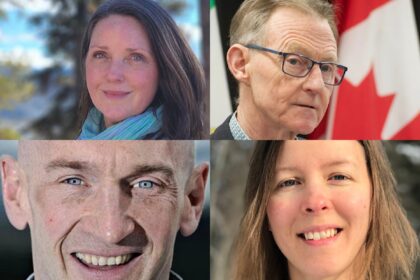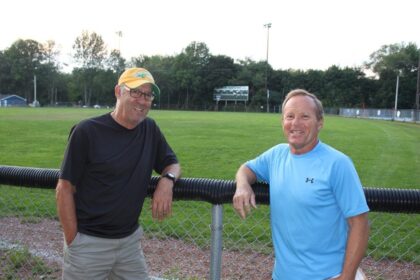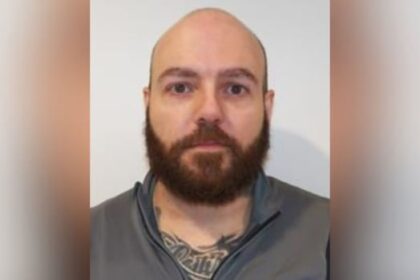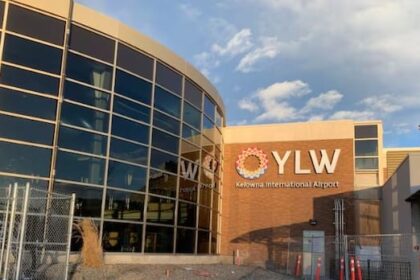Prime Minister Mark Carney’s two-day First Nations major projects summit closed on July 17, with a one hour question-and-answer session, moderated by Mi’kmaq MP Jaime Battiste, Parliamentary Secretary to the minister of Crown-Indigenous Relations. The session was held behind closed-doors and media were not allowed in, with the exception of the opening speech by the prime minister. Leaked audio tapes of the event have allowed APTN News to hear what happened inside. Here is a full and unedited recording of the prime minister’s Q and A session Although chiefs had been asked to submit questions in advance, most questions were taken from the floor. Battiste grouped the questions in sets of three, with Carney responding to each series. The meeting was held at the Great Hall inside the Canadian Museum of History, in Gatineau. Carney called the summit in response to criticism over the Building Canada Act—a new law that gives cabinet sweeping power to bypass existing legislation in order to fast-track energy and infrastructure projects deemed in the national interest. The summit drew several cabinet ministers, Indigenous MPs, and hundreds of First Nations leaders and stakeholders. Will you respect Treaty rights? The first question of the day went to Chief David Monias, of Pimicikamak Okimawin who took the opportunity to present the prime minister with a copy of a treaty medal. “I wanted to give it to you to remind you that we’re treaty partners and that we uphold the treaties as they were written with respect and honor for the sake of our people that are back home,” said Monias. “ That was the first ‘one economy’ signature that was done by our people.“ Monias then asked if the government can move swiftly for industry and jurisdiction, why it had not moved swiftly to implement legal rights of Indigenous people. He sought a commitment from Carney on Treaty rights and Indigenous rights protected by Section 35 of the Constitution. Battiste then read a similar written question from Ditidaht Chief Councillor Judi Thomas who asked “How will your government ensure that Bill C five does not override or undermine constitutionally protected First Nations under Section 35?” “With respect to overriding Section 35 rights, we will never do that. This government will never do that,” replied Carney. He went on to say that was “a low bar to set” because Section 35 is a legal constitutional obligation and a responsibility of any government. “I think the test for us and myself and the ministers here representing the government is much bigger, obviously the test for us is how do we respect that? How do we live up to those responsibilities? What’s the level of consultation? How do we work together? How true partnerships are developing.” Carney said he would begin a process to help define how to do that, and make it “very specific around specific projects on which we’re working together. We will always respect this. We need to respect it and live it and make it real at a higher level and a tangible way.” “With respect to modern treaties and the roles of modern treaties. Absolutely. Front and center in this process. Without question, you’ve asked a bigger question, a more fundamental question about, Section 35, agreement and a broader approach. “My point, our point would be that how we work on these projects is going to help inform and build and ensure that when we get that broader approach that we need, that it’s going to be the right approach. And that’s what co-development means. That’s what co-working needs,” Carney said. Carney will not amend the law Some chiefs – including Abram Benedict, the Ontario Regional Chief for the Chiefs of Ontario – went into the meeting hoping Carney would agree to bring the law back to Parliament for amendments. Nine First Nations in Ontario are launching legal action to try and stop the One Canadian Economy Act saying it threatens their right to self determination, the environment and fundamental human freedoms. Mississaugas of Scugog Island First Nation is not among those involved in the court case, but Chief First Nation Kelly LaRocca speaking on behalf of the Mississauga Nation communities told Carney they reject the law. “We unequivocally reject Bill 5 and say, no. That’s in honor of our youth who we heard speak yesterday at the Chiefs of Ontario,” said LaRocca. “ In response to a bully, the federal government has run roughshod over First Nations. You risk repeating historical mistakes for which your government has long since apologized,” she said. “Ramming Bill C-5 through Parliament without consultation is a resounding call to action of our First Nation governments. Democracy is at its most vulnerable.” LaRocca asked if the government would amend the law to include free, prior and informed consent, noting that the law requires written consent from provinces and territories, but does not state it requires consent from First Nations. She also asked if the Act could be amended to include accommodations, and consider a substantive repeal of the section of the act that allows the federal Cabinet to allow certain major projects to skip specific environmental rules or laws that would normally apply. Carney’s reply suggests the government is not willing to reopen the legislation for amendments. “With respect to the bill which is now law of the land, the issue is how we move forward with it, ” Carney replied. “How consultations, once they begin on these projects, are conducted.” “How, if a project is possible to be of interest, if there is support for a project, what are the conditions around those projects and the consultations for those conditions, how the accountability for fulfilling those conditions is in place. And what are the penalties for those project proponents if they don’t meet all of those conditions? And that process is about to begin.” What happens if First Nations say no? The question of the right to withhold consent and stop a project came up more than once. With the most directly phrased question coming from a man who identified himself as a citizen of Gitxsan and Wet‘suwet’en First Nations. “What I’m concerned about here in this process is what happens when we say no. And Wet’suwet’en had to learn that the hard way. We learned what happens when we say no,” he said, referencing aggressive responses by police to land protectors that took place from 2019 to 2020. “With respect to the last question in terms of the approach that you referenced. It’s not one with which I’m very familiar. I know the headlines of it, but I don’t know the details,” replied Carney. “There are different views even in this room about the desirability of that project, amongst different First Nations. And the question is, is there a process that can develop and reconcile those views, so that there’s a consensus around it and the project, with certain conditions in a certain way as possible? And if not, there will be other projects,” Carney said. “ In terms of letters that…, input that I’ve received directly, my fellow members of cabinet have received and the government have received, there are a lot of projects that have the characteristics that we’ve been talking about first and foremost, that are in the interest and are proposed and championed by, First Nations and that are supportive of our environmental goals and that have major economic benefits,” Carney told the chiefs. “There are a lot of projects that are being proposed and we are going to focus on those where there is support, those where there are possibilities, those where we can help make a difference.” How do smaller communities with less resources fit in? Lennox Island First Nation Chief Tabatha Bernard asked, through a written question, how the government would ensure smaller communities have capacity to get their “elbows up at the table” that truly benefit the First Nation, especially if projects are fast-tracked. In reply Carney spoke about increasing funding including the Indigenous Loan Guarantee Program, which he doubled after he was elected. “Effectively, it’s free financing of equity participation investment. That’s what that $10 billion is there for. That’s also what the $40 million that we announced for capacity building and an ability to be at the table and help negotiate, as well,” he replied. What about protection for land and water? A number of chiefs raised the issue of climate, land and water protection. Including Thunderchild Chief Delbert Wapass. “You have to understand that as an indigenous leader, as a First Nations leader, I have an obligation for our Mother Earth. And how we work together is important, right?” asked Wapass. “So when we’re silent on jurisdiction, Indian jurisdiction for our natural resources in C-5, it then begs the question in regards to the acknowledgement of our resources that we are stewards of and that we are responsible and we have a duty to look after,” said Wapass. “The structure of this legislation, the protections in this legislation in terms of-and the spirit of this government in terms of free prior and informed consent, true partnership, the protections for the environment, being consistent with our climate change objectives, being consistent with our objectives in nature and biodiversity, recognizing that you are the guardians of the land,” said Carney. “We have to work together. With all due respect to the provinces, the protections in these legislation, the spirit of this legislation, the intent of this legislation, the reality of what we will do will far exceed what any province will do. We are the partner. We are the partner, which will deliver the hope that your children and our children deserve, the standards and the values that you have lived since time immemorial, not the provinces,” he said. “So if the provinces are there and you’re not there, we’re not there. If the provinces aren’t trying hard enough, we’ll bring them up. And I say that as someone whose job it is to work closely with the provinces.” Promises cuts will not impact programs and services An internal government email leaked to the government last week confirmed Carney has asked ISC, like other departments, to cut planned spending by up to 15 per cent over three years. A few leaders, including the AFN Regional Chief from New Brunswick Joanna Bernard asked about program cuts. “How can you cut our Indigenous programs when we have been asking for increases and dire needs, and then you turn around and ask us to come to the table?” asked Bernard. “ This government will continue to deliver the services for which we are responsible. Okay? We have to do more, not less,” said Carney. “We have to do more, not less. That’s absolutely clear. That’s in social services, that’s in policing, that’s in health, that’s in education. And then there’s the broader – I’m looking to Grand Chief Woodhouse, National Chief, I’m sorry, National Chief – and the infrastructure gap as well.” AFN National Chief Cindy Woodhouse Nepinak has been lobbying the government to commit funds to close gaps on infrastructure including water, roads and housing on reserve. Visits to First Nations The Prime Minister also agreed to visit some First Nations, notably the Mississaugas of Scugog Island First Nation region and Cold Lake First Nation. Tags: Abram Benedict, Building Canada Act, Carney, Chiefs Summit, CIRNAC, Constitution, Consultation, Crown-Indigenous Relations, David Monias, ministers, National Chief Cindy Woodhouse Nepinak, One Canadian Economy Act, Prime Minister Mark Carney, Section 35, Treaty, Treaty Rights Continue Reading
Leaked tape: If the provinces arent trying hard enough, well bring them up Carney tells chiefs
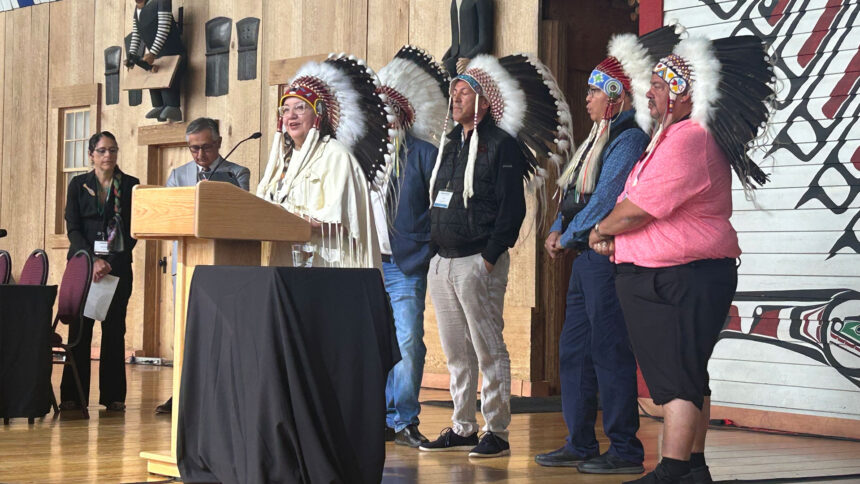
Leave a Comment







